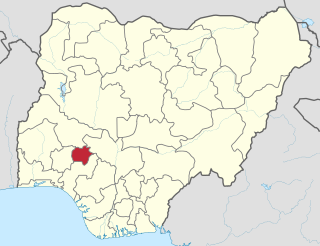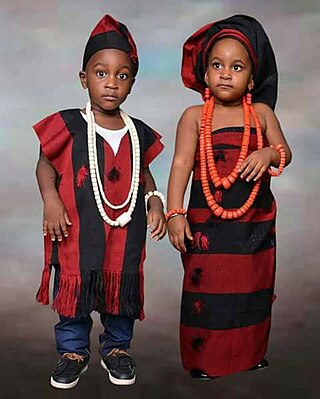Related Research Articles

Cross River State is a state in the South-South geopolitical zone of Nigeria. Named for the Cross River, the state was formed from the eastern part of the Eastern Region on 27 May 1967. Its capital is Calabar, it borders to the north through Benue state, to the west through Ebonyi state and Abia state, and to the southwest through Akwa Ibom state,while its eastern border forms part of the national border with Cameroon. Originally known as the South-Eastern State before being renamed in 1976, Cross River state formerly included the area that is now Akwa Ibom state, which became a distinct state in 1987.

Benue State is one of the North Central states in Nigeria with a population of about 4,253,641 in 2006 census. The state was created in 1976 among the 7 states created at that time.The state derives its name from the Benue River which is the second largest river in Nigeria. The state borders Nasarawa State to the North; Taraba State to the East; Kogi State to the West; Enugu State to the South-West; Ebonyi and Cross-Rivers States to the South; and has an international border with Cameroon to the South-East. It is inhabited predominantly by the Tiv, Idoma and Igede. Minority ethnic groups in Benue are Etulo, Igbo, Jukunpeoples etc. Its capital is Makurdi. Benue is a rich agricultural region; popularly grown crops include: oranges, mangoes, sweet potatoes, cassava, soya bean, guinea corn, flax, yams, sesame, rice, groundnuts, and Palm Tree.

Ekiti State is a state in southwestern Nigeria, bordered to the north by Kwara State, to the northeast by Kogi State, to the south and southeast by Ondo State, and to the west by Osun State. Named for the Ekiti people—the Yoruba subgroup that make up the majority of the state's population—Ekiti State was formed from a part of Ondo State in 1996 and has its capital as the city of Ado-Ekiti.

The Idomas are people that primarily inhabit the lower western areas of Benue State, Nigeria, and some of them can be found in Taraba State, Cross Rivers State, Enugu State, Kogi State and Nasarawa State in Nigeria. The Idoma language is classified in the Akweya subgroup of the Idomoid languages of the Volta–Niger family, which include Igede, Alago, Agatu, Etulo, Ete, Akweya (Akpa) and Yala languages of Benue, Nasarawa, Kogi, Enugu, and Northern Cross River states. The Akweya subgroup is closely related to the Yatye-Akpa sub-group. The bulk of the territory is inland, south of river Benue, some seventy-two kilometres east of its confluence with River Niger. The Idoma tribe are known to be 'warriors' and 'hunters' of class, but hospitable and peace-loving. The greater part of Idoma land remained largely unknown to the West until the 1920s, leaving much of the colourful traditional culture of the Idoma intact. The population of the Idomas is estimated to be about 3.5 million. The Idoma people have a traditional ruler called the Och'Idoma who is the head of the Idoma Area Traditional Council. This was introduced by the British. Each community has its own traditional chief such as the Ad'Ogbadibo of Orokam, Chief D.E Enenche. The Palace of the Och'Idoma is located at Otukpo, Benue State. The present Och'Idoma, HRM, Elaigwu Odogbo John, the 5th Och'Idoma of the Idoma People was installed on the 30th of June, 2022 following the passing of his Predecessor HRH Agabaidu Elias Ikoyi Obekpa who ruled from 1996 to October 2021. Past Och'Idomas also include: HRH, Agabaidu Edwin Ogbu, who reigned from 1996 to 1997, HRH, Abraham Ajene Okpabi of Igede descent who ruled from 1960 to 1995 and HRH, Agabaidu Ogiri Oko whose reign took place between 1948 and 1959.

Makurdi is the capital of Benue State, located in central Nigeria, and part of the Middle Belt region of central Nigeria. The city is situated on the south bank of the Benue River. In 2016, Makurdi and the surrounding areas had an estimated population of 365,000.

The Oṣun River is a river that flows southwards through central Yorubaland in southwestern Nigeria into the Lagos Lagoon and the Atlantic Gulf of Guinea. It is one of the several rivers ascribed in local mythology to have been women who turned into flowing waters after some traumatic event frightened or angered them.
Otukpo is a town in Benue State, Nigeria located in the Middle Belt Region of Nigeria. It is also the eponymous name of a subgroup of the Idoma people. Otukpo is the headquarters of the Otukpo Local Government Area. It was the headquarters of the former Idoma Province, and remains an important town in Idomaland, an area mainly populated by the Idoma speaking people, though with numerous local dialects spoken in the diverse reaches of Idoma land. Otukpo Idoma language is the umbrella lingua.
Yala is a Local Government Area in Cross River State, Nigeria. Its headquarters is in the town of Okpoma in the east of the area at 6°35′35″N8°38′01″E.
Oliver Sunday Akanite, better known by the stage name Oliver De Coque, was a Nigerian guitarist and one of Africa's most prolific recording artists.

Idoma is the second official language spoken in Benue State in southeast-central Nigeria, by approximately 600,000 people. The Idoma language is made up of the dialects of Agatu, Otukpo, Otukpa, Orokam, Akpa Agila, Utonkon, Igede, Etilo, Iyala. The Idoma people are predominantly hunters, farmers and fishermen. They are bordered to the north by Nasarawa, south by cross river, east by Taraba and west by Enugu and Kogi States.
The Idomoid languages are spoken primarily in Benue State of east-central Nigeria and surrounding regions. Idoma itself is an official language spoken by nearly four million people including the subgroups of Igede, Uffia, Otukpo, and Orokam.
Béké or beke is an Antillean Creole term to describe a descendant of the early European, usually French, settlers in the French Antilles.
Irepodun/Ifelodun is a Local Government Area of Ekiti State, Nigeria. Irepodun/Ifelodun is predominantly a homogeneous society and carefully populated by Yoruba speaking people of the South West of Nigeria. It has an area of 356 km2 and a population of 129,149 at the 2006 census. The major religions of the people are Christianity and Islam while a percentage of the people are traditional religion worshippers.
The Ukelle people (Ba'kelle) make up roughly half of the population of the Yala Local Government Area in Cross River State, Nigeria. Ukelle people are a sub ethnic group belonging to the Orring people who are also found in Benue in Utonkon, and in different LGAs of Ebonyi State. The dialect of the Ukelle people is Kukelle belonging to the Korring language family.
The Igede people are a Nigerian ethnic group in Lower Benue State of Nigeria. They are native to the Oju and Obi local government areas of Nigeria, where 2006 population figures stand at an estimated 267,198 people. However, many Igede people are dispersed across the state and the Nation. For instance, the Igede language is also spoken in Nigeria's Cross River State, and many Igede communities exist in Osun State and Ogun State. The Igede language is a member of the Benue-Congo subgroup of the Niger-Congo language family.

The Ikogosi Warm Springs is a tourist attraction located at Ikogosi, a town in Ekiti State, southwestern Nigeria. Flowing abreast the warm spring is another cold spring which meets the warm spring at a confluence, each maintaining its thermal properties. These attributes make the spring a tourist attraction in Nigeria. Research suggested that the warm spring has a temperature of about 70°C at the source and 37°C at the confluence.
Iwoye-Ketu is a town primarily located in Imeko Afon, Ogun State in southwest Nigeria with its western portion in Benin. The community shares a border with the Iwajowa local government area of Oyo State on the north. It is renowned for its production of cotton.
Gabu is situated in Yala Local Government Area of Cross River State, Nigeria. Its geographical coordinates are 6° 51' 0" North, 8° 46' 0" East. It is bounded to the North by Benue State, South by Ijegu – Yala, to the East by Aliforkpa, and to the West by the Igede-speaking part of Benue State. The only language spoken by the Gabu people is Igede, though English and Pidgin English are occasionally spoken for official purposes. Gabu possesses good climatic soil and vegetation conditions that provide agricultural and agro-allied industrial potentials. A large part of the Gabu region consists of grassland or savanna and rain forest at places such as Ega, Ajumole, Adikpe, etc. This variety of soils and vegetation makes possible the cultivation of a wide variety of agricultural produce ranging from food to cash crops. The food crops grown include yams, cassava, cocoyam, maize, beans, rice, millet, and other market and garden crops. Some of the cash crops that thrive well in the region also include palm-oil, bananas, plantains, etc.
The Igede are an ethnic group in Nigeria.
Celestine Ukwu was a Nigerian Igbo highlife musician during the 1960s and 1970s, best known for his hit songs "Ije Enu", "Igede" and "Money Palava". Described as a "prolific and outstanding composer" by music critic Benson Idonije of Radio Nigeria Two, Ukwu's works have been featured on various world music compilations including The Rough Guide to Highlife and The Rough Guide to Psychedelic Africa.
References
- 1 2 Igede at Ethnologue (25th ed., 2022)
- Richard Bergman, 1981. An outline of Igede grammar